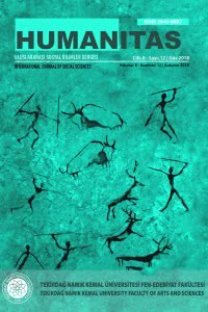İnsanın Zaman Deneyiminin Fizyolojik ve Psikolojik Temelleri
Bilinç, Biyolojik zaman, İnsan, Psikolojik zaman, Zaman, Zaman deneyimi
The Physiological and Psychological Bases of the Time Experience of Human
Consciousness, Biological time, Human, Psychological time, Time, Experience of time,
___
- Aristoteles (2012). Fizik, (S. Babür, Çev.). İstanbul: Yapı Kredi Yayınları. (Orijinal çalışma basım tarihi 1837).
- Augustine (1912). Confessions. (W. Watts, Çev.). New York: The Macmillian Company. (Orijinal çalışma basım tarihi MS 340).
- Bergson, H. (1929). Matter and memory. (N. M. Paul ve W. S. Palmer, Çev.). New York: The Macmillan Company. (Orijinal çalışma basım tarihi 1896).
- Bergson, H. (1947). Yaratıcı tekamül. (M. Ş. Tunç, Çev.). İstanbul: Milli Eğitim Basımevi. (Orijinal çalışma basım tarihi 1907).
- Bergson, H. (1950). Time and free will: an essay on the immediate data of consciousness. (F. L. Pogson, Çev.). London: George Allen and Unwin Ltd. (Orijinal çalışma basım tarihi 1889).
- Bergson, H. (1978). An introduction to metaphysics. (T. E. Hulme, Çev.). New York: The Knickerbocker Press. (Orijinal çalışma basım tarihi 1903).
- Birx, H. J. (2009). Encylopedia of time. California: Sage Publications.
- Blackburn, S. (2008). Dictionary of philosophy. Oxford: Oxford University Press.
- Block, R. A. ve Gruber, R. P. (2014). Time perception, attention and memory: A selective review. Acta Psychologica, 149(2014), 129-133.
- Colman, A. M. (2009). A dictionary of psychology. Oxford: Oxford University Press.
- Csikszentmihalyi, M. (2008). Flow: The psychology of optimal experience. New York: Harper Collins.
- Davis, A. H. (2011). The book of time. London: Mitchell Beazley.
- Draaisma, D. (2017). Yaşlandıkça hayat neden çabuk geçer? (G. Koca, Çev.). İstanbul: Metis Yayınları. (Orijinal çalışma basım tarihi 2001).
- Eroğlu, A. (2012). Henri Bergson’da bilinç-sezgi ilişkisi. SDÜ Fen Edebiyat Fakültesi Sosyal Bilimler Dergisi, 27, 81-102.
- Foer, J. (2008). Caveman: an interview with Michel Siffre. Cabinet, 30(1), 1-6.
- Friston, K., Gu, X., Hof, P. ve Fan, J. (2013). Anterior insular cortex and emotional awareness. The Journal of Comparative Neurology, 521(15), 3371-3388.
- Goldman, M. ve Markov D. (2006). Normal sleep and circadian rhythms: Neurobiologic mechanisms underlying sleep and wakefulness. Psychiatric Clinics of North America, 29(4), 841-853.
- Gündoğan, A. O. (1988). Aristoteles’in zaman görüşü ile Bergson’un zaman zörüşünün karşılaştırılması (Yayımlanmamış yüksek lisans tezi). Atatürk Üniversitesi, Erzurum.
- Hall, E. T. (1983). The dance of life: the other dimension of time. New York: Anchor Press.
- Klein, S. (2009). Time: A user’s guide. (S. Frish, Çev.). London: Penguin Books. (Orijinal çalışma basım tarihi 2008).
- Kurtoğlu Taşdelen, D. (2003). Bergson’s conception of time: Its Effects on a Possible Philosophy of Life (Yayımlanmamış Doktora Tezi). Orta Doğu Teknik Üniversitesi, Ankara.
- Mengüşoğlu, T. (2015). İnsan felsefesi. Ankara: Doğu Batı Yayınları.
- Platon (2001). Timaios. (E. Güney ve L. Ay, Çev.). İstanbul: Sosyal Yayınlar. (Orijinal çalışma basım tarihi 1888).
- Pöppel, E. (1988). Mindworks: time and concious experience. (T. Artin, Çev.). Boston: Harcourt Brace Jovanovich. (Orijinal çalışma basım tarihi 1988).
- Pöppel, E. (2004). Lost in time: a historical frame, elementary processing units and the 3-second window. Acta Neurobiologiae Experimentalis, 64, 295-301.
- Richter, C. P. (1978). ‘Dark-active’ rat transformed into ‘light-active’ rat by destruction of 24-hr clock: Function of 24-hr clock and synchronizers. National Academic Science, 75(12), 6276-6280.
- Saraçoğlu, E. (2014). Henri Bergson’da bilinç ve zaman problemlerinin irdelenmesi (Yayımlanmamış yüksek lisans tezi). İstanbul Üniversitesi, İstanbul.
- Shaw, I. (2004). The oxford history of ancient Egypt. Oxford: Oxford University Press.
- Srinivason, V., Singh, J., Pandi-Perumal, S., Spence, W., Brown, G. ve Cardinalli, D. (2010). Jetlag, circadian rhythm sleep disturbances and depression: the role of melatonin and its analogs. Publicado en: Advances in Theraphy, 27(11), 796-813.
- Sunar, C. (1970). Bergson’da şuur halleri ve zaman. Ankara Üniversitesi İlahiyat Fakültesi Dergisi, 18, 47-66.
- Şenel, F. (2008). Biyolojik zaman. Bilim ve Teknik, 483(12), 58-67.
- Topçu, N. (1998). Bergson. İstanbul: Dergâh Yayınları.
- Warren, H. M. (1996). Neuropsychology of timing and time perception. Cognitive Brain Research, 3(1996), 227-242.
- Wittmann, M. (2018). Hissedilen zaman. (Ö. D. Gürkan, Çev.). İstanbul: Metis Yayınları. (Orijinal çalışma basım tarihi 2016).
- Yüksel, A. (2016). Uyku, biyolojik ritim ve kimya: Tüketicilerin bilişsel ve duygusal fonksiyonları üzerine. Seyahat ve Otel İşletmeciliği Dergisi, 13(1), 121-127.
- ISSN: 2147-088X
- Yayın Aralığı: Yılda 2 Sayı
- Başlangıç: 2013
- Yayıncı: Namık Kemal Üniversitesi
Hassan Blasim'in Kısa Hikayelerindeki Göçmenin “Kayıp Tanıklığı”
Histeri, Delilik ve Disiplin Edici Güç: The Next Room ve Mrs. Packard
Etika’nın Sosyolojik Tahayyülü ve Spinoza’nın Sosyolojiye Etkileri Üzerine
Modiano’nun Encre Sympathique Adlı Romanında Bellek
Satranç: Doğu Medeniyetinin Batı'ya Bir Hediyesi
Recaizâde Mahmut Ekrem’in Tiyatroları
Kurumlar Sosyolojisi Perspektifinden Pandemi Döneminde Kurumsallaşma Pratikleri
Makine Çevirisinin Çeviri Eğitimindeki Yeri
Dorian Gray'in Portresinin Uyarıcı Hikayesi: Kıssa ve Otobiyografi
